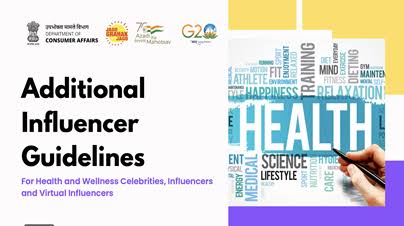Government Introduces Stringent Guidelines for Health and Wellness Celebrities and Influencers to Curb Misleading Advertisements

In a bid to counteract misleading advertisements and ensure transparency in the endorsement of health and wellness products, the central government has rolled out a comprehensive set of guidelines for Health and Wellness Celebrities, Influencers, and Virtual Influencers operating in the health and wellness sector. This move comes as a response to growing concerns about deceptive marketing practices in the industry.
The Consumer Affairs Ministry has stated that these additional guidelines are specifically designed to tackle the problem of misleading advertisements, curb unsubstantiated claims, and enhance overall transparency in the realm of health and wellness endorsements. The guidelines are an extension of the previously established "Guidelines for Prevention of Misleading Advertisements and Endorsements for Misleading Advertisements, 2022," which were released on June 9, 2022.
Under the new guidelines, certified medical practitioners and health experts who engage in promoting products or making health-related claims are now mandated to disclose their professional qualifications as certified health and fitness experts and medical practitioners. The ministry further emphasized that any celebrities or influencers who present themselves as health professionals or medical practitioners must provide clear and unambiguous disclaimers. Additionally, the guidelines recommend actively encouraging audiences to seek professional medical advice from qualified healthcare professionals and obtain complete information about the endorsed products.
The Consumer Affairs Ministry has stressed that violations of these guidelines could result in penalties under the Consumer Protection Act of 2019 and other relevant legal provisions. The introduction of these guidelines aims to reinforce the health and wellness industry while also prioritizing the safeguarding of consumer interests.
Misleading advertisements have posed a significant challenge for consumers who often rely on information provided by celebrities and influencers. As a response to this issue, the government is taking proactive measures to ensure the accuracy and transparency of information disseminated by such prominent figures. In line with this objective, the government has already initiated various efforts to educate consumers and raise awareness about deceptive marketing practices.
According to the guidelines, celebrities, influencers, and virtual influencers who portray themselves as health professionals or medical practitioners are obligated to provide explicit disclaimers. These disclaimers serve to underscore that the information being shared should not be considered a substitute for professional medical advice, diagnosis, or treatment.
However, the guidelines also recognize the importance of general wellness advice that does not involve specific products or services, nor is aimed at addressing specific health conditions. Recommendations such as "Drink Water and Stay Hydrated," "Exercise Regularly and Be Physically Active," "Get Enough Good Sleep," and other similar broad health tips fall outside the purview of these regulations.
In conclusion, the central government's introduction of stringent guidelines for Health and Wellness Celebrities, Influencers, and Virtual Influencers represents a significant step towards curbing misleading advertisements and enhancing transparency within the health and wellness sector. By encouraging clear disclosures, accurate endorsements, and responsible behavior, these guidelines aim to safeguard consumers while fostering the growth of an ethical and trustworthy industry.
